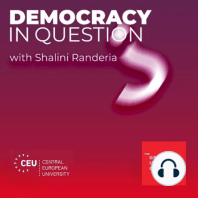26 min listen

Sergei Guriev on the Changing Face of Autocracy
Sergei Guriev on the Changing Face of Autocracy
ratings:
Length:
44 minutes
Released:
Mar 29, 2023
Format:
Podcast episode
Description
Guests featured in this episode:Sergei Guriev, Provost of Sciences Po in Paris. He's professor of economics there following an outstanding academic career at the New Economic School in Moscow. He was its Rector until 2013 when he was forced by political circumstances to leave Russia. Between 2016 and 2019, Sergei served as the chief economist of the European Bank for Reconstruction and Development. And he has held visiting professorships at MIT, Princeton. And in 2006, he was selected a Young Global Leader by the World Economic Forum.His very broad research interests span various areas of political economics, developmental economics, labor mobility, corporate governance and contract theory. And besides numerous academic publications, he also writes for "The New York Times," "Financial Times," "Washington Post," and "Project Syndicate." His latest book, "Spin Dictators," written together with Daniel Treisman, is a fascinating account of the changing character of authoritarian politics. GlossaryWhat is China’s “zero-COVID” policy?(23:25 or p.6 in the transcript)COVID-19, a highly contagious respiratory illness, was first detected in Wuhan, China, in 2019 and rapidly spread throughout the country and the world, giving rise to a multiyear pandemic that resulted in millions of deaths worldwide. In efforts to keep the disease from spreading, China implemented strict “zero-COVID” policies aimed at keeping the number of cases as close to zero as possible through measures including strict lockdowns, quarantines, and mass testing. As a result, infection cases and deaths were relatively lower in China compared with other wealthy countries. Despite residents’ initial support of government policies and China’s early success in containing the spread of the disease, many grew frustrated as the restrictions became harsher and longer due to an increased number of cases resulting from highly transmissible variants. Repeated lockdowns and testing disrupted residents’ daily life and travel across the country. Some parts of China, such as Yining and Guiyang, experienced shortages of food and other essential items. The zero-COVID policies were eased in December 2022 following a rare protest by thousands of Chinese residents demanding that the government end the harsh policies, some even calling for the resignation of Xi Jinping. sourceWhat was the 2014 illegal annexation of Crimea?(25:10 or p.7 in the transcript)Almost immediately after the 2014 Maidan Revolution in Ukraine ended, armed men began occupying key facilities and checkpoints on the Crimean Peninsula. They wore Russian combat fatigues but with no identifying insignia. President Vladimir Putin at first flatly denied these were Russian soldiers, only to later admit that they were and award commendations to their commanders. The sizeable Ukrainian military presence in Crimea stayed in garrison. If shooting began, Kyiv wanted the world to see the Russians fire first. Ukraine’s Western partners urged Kyiv not to take precipitate action. Since many enlisted personnel in the Ukrainian ranks came from Crimea, Ukrainian commanders probably had less than full confidence in the reliability of their troops. By early March, Russian troops had secured the entire peninsula. On March 6, the Crimean Supreme Council voted to ask to accede to Russia. The council scheduled a referendum for March 16, which offered two choices: join Russia or return to Crimea’s 1992 constitution, which gave the peninsula significant autonomy. Those who favoured Crimea remaining part of Ukraine under the current constitution had no box to check. The conduct of the referendum proved chaotic and took place absent any credible international observers. Local authorities reported a turnout of 83 percent, with 96.7 percent voting to join Russia. The numbers seemed implausible, given that ethnic Ukrainians and Crimean Tatars accounted for almost 40 percent of the peninsula’s population. (Two months later, a leaked report from the Rus
Released:
Mar 29, 2023
Format:
Podcast episode
Titles in the series (77)
Undermining democracy by democratic means: how can we stop it? by Democracy in Question?